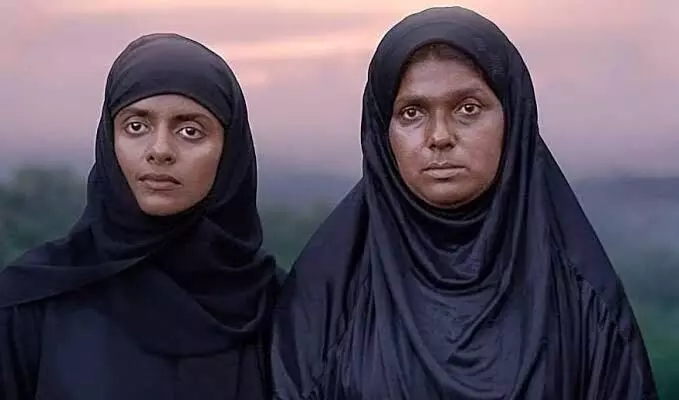

Biriyani: Half cooked and utterly unappetizing
text_fieldsBiriyani, the third directorial venture of Sajin Baabu is considered by the "guardians" of the "progressive Malayali" space as a poignant showcasing of the lives of the Muslim women living under the patriarchal religious structure.
The icon of a Muslim woman, veiled and lingering only inside the house; an idyllic damsel in distress, was always a fascination, if not a fetish for the "progressives", "the moderns", and "the unapologetic atheists", and in Biriyani, through Khadeeja (portrayed by Kani Kusruti), the protagonist, Sajin Baabu was successful in quenching that insatiable fetish. Perhaps that is the only thing he was successful in achieving through the movie, given the shallow screenplay riddled with stark logical potholes.
Nonetheless, the director does not deserve only criticisms for his venture, since he tried, often tirelessly through needless and grotesque scenes like the butchering of the lamb in a montage with circumcision, to demonize a community that has been demonized globally. After all, that level of ignorance (or violence) does deserve a level of praise.
The film starts with Khadeeja and her husband having sex. He cannot satisfy her, and it is evident. When she tries to pleasure herself, she is shunned and the husband puts the blame on her half-done FGM for her sexual perversity. FGM in Kerala is not non-existent; there had been a few cases over time. But the movie, with its sheer ignorance, managed to portray the practice as something intrinsically Islamicate.
This shows the utter lack of research about the issue that the movie claimed to represent and the movie's ultimate recourse to the portrayal of stereotypes that lies far away from the quotidian Kerala Muslim lives and if one wonders these stereotypes are only intended to satisfy the anti-minority sentiments, they won't be wrong.
Khadeeja is the thorn of the family because she is the daughter of a mentally ill fisherwoman. When the news comes that her lost brother has joined a terrorist organization, both Khadeeja and her mother are cast out by the community and the husband divorces her over a text message. Calling this anachronistic will be an understatement given that the now BJP-led central government is wielding its notorious triple talaq bill (2018) to criminalise Muslim men who engage in the instant divorce.
Notwithstanding this legal pothole, the act of divorcing through text is something that Muslim men rarely engages in; the act itself is despicable just like the director's attempt to show it as a common phenomenon in the community.
Another thing to note here is that, even now, the director was unable to restrain himself from including a terrorist narrative in a movie claiming to portray Muslim lives and, needless to say, this addition was not at all innocent. "When will the women be saved from the debilitating sorrow of their men joining terrorist organizations!", director laments; and the public too, laments with him.
Upon having a confrontation with the police about her brother and then losing their home, the mother-daughter duo seeks shelter in a mosque where they encounter a compassionate muezzin who helps them; as a symbolic guide to the journey of her soul. The muezzin masturbates and Khadeeja sees it; why? I don't know. Perhaps to show that all Muslim men are sexually frustrated? It certainly seems so. After receiving news that the "extremist" brother was killed, Khadeeja and her mother go to the muezzin's now-empty home and try to find a living with the money the muezzin kindly entrusted to her, but the mother dies in a fateful turn of events, almost as if by a sadistic turn of a pen.
Then the transformative phase in Khadeeja's life ensues. She has sex with a local man who was lecherously eying her constantly, then with his help navigates the life of physical intimacy, engaging in sex work. She reads a book titled 'Islam and Sex'; this scene is intended to religiously underpin the transformative phase, the motivations and the actions. After this phase, she is assaulted by the police and suffers the stillbirth of her child. Revengeful, she invites all of the main actors of the society- the priests, the party members, her ex-husband, the police etc.- for iftar and cooks the dead body of her fetus into a Biriyani and serves it to them. A cathartic scene was intended but failed to deliver.
In the movie, we are confronted with a protagonist, Khadeeja, who through her actions, attempts to break free of what is supposed to be the shackles that incarcerate her to a life of toil. The apparent struggle of Khadeeja is the bread and butter of the movie, and Kani tried her best to show justice to the overall aim of the film, that is to capitalize on the Islamophobic sentiments of the public- "progressive" psyche. Through the protagonist, a victim, according to the filmmaker, of the religiously sanctioned marginalisation of women, sex emblematizes a path to liberation.
This is the thread that runs throughout the movie in association with a shallow and outside imagination of what constitutes the "problem of Muslim women". The usage of sex as a liberatory mechanism is inspired, but the director's usage of this theme, brimming with potential, to only condemn a community as sexually deprived, points towards the growing trend among the so-called progressives to use the socially shunned terms to flaunt their artistry and to bag an arm-chair space in the progressive space so that they can sit comfortably, looking down upon the toiling masses, sipping cheap liquor while discussing the social implications of the Odessa steps.
The movie tried to emphasize the physicality of the body and portray the body at its barest, clumsiest, and violent moments, but often the poignancy fell short of a mile as the scenes and sequences were nothing but grotesque.
A series of violent scenes, most of which were attributed to the "barbarity" of the community, penned by a person with an immense saviour complex, Biriyani was like a tale told by an idiot, full of sound and fury, signifying nothing.

















